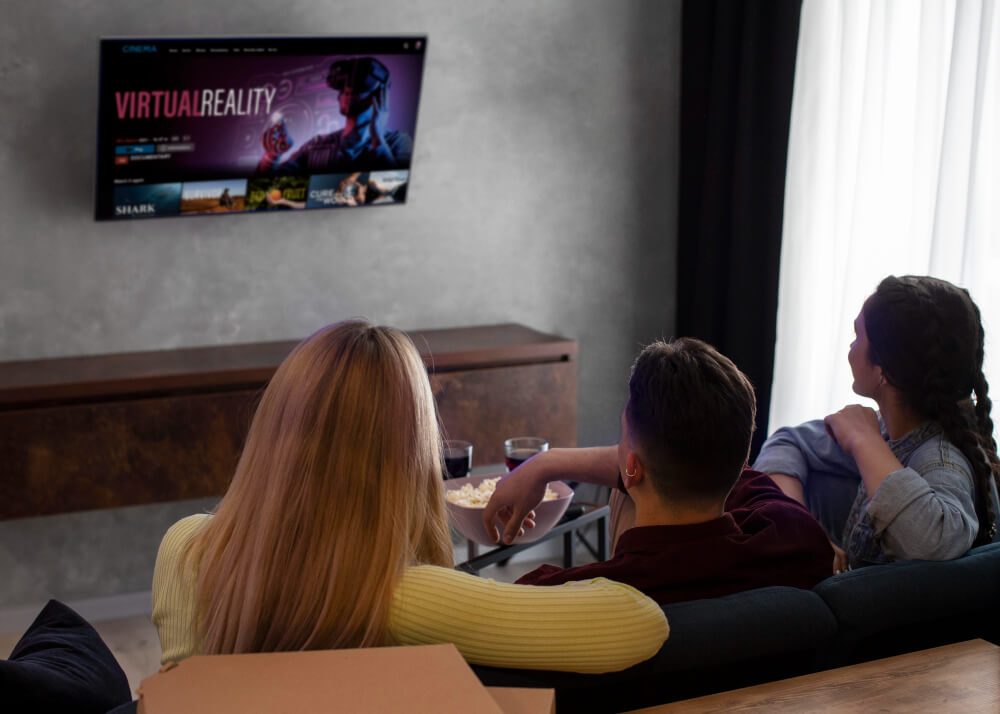Top blog articles
Smart TVs were once a Sci-Fi concept you could see in an 80’s movie. Now, they’re in our homes, giving us endless entertainment through the magic of the internet. Treating yourself to a new smart TV can improve your viewing experience, but with so many things to consider, it can be challenging to make the right choice. If you are overwhelmed with all the options, look no further—we are here to answer all of your questions and more.
What Do You Need To Consider Before Buying
You need to know what to look for if you want to enjoy your favorite content seamlessly. However, the image quality and the convenience of use are not everything when it comes to smart devices.
Screen Size
Screen size is one of the most important factors homeowners consider before they purchase smart TVs. The size of your TV should match the size of your living room, the distance from where you’ll be sitting to the screen, and various other factors. A good tip is to set the viewing distance equal to about 1.5 – 2.5 times the diagonal screen size.
In a smaller living room, for instance, a 40 to 55-inch TV may be the best option. For larger rooms or home theaters, you could consider a screen of 65 inches or larger. Keep in mind that a larger screen adds more to the experience, but the screen size should fit into your room without taking away too much from it.
Resolution
Resolution plays a huge part in how good the picture on your SmartTV is. Most screens today have a resolution of HD (1080p), 4K Ultra HD, or 8K.
HD is great for people with smaller TVs or who don’t care too much about crystal-clear images. The most popular choice for SmartTVs is 4K Ultra HD, which has four times the quality of 1080p. The sharpness and detail it produces are breathtaking, especially on larger screens. 8K is the newest technology and has an even higher resolution. However, there isn’t a lot of material available in 8K yet, and these TVs cost a lot more. A 4K TV is a good choice for most homes because it’s a good mix of price and performance.
Operating System and Smart Features
Different operating systems (OS) on SmartTVs influence how easy it is to navigate menus, apps, and settings. For example, Roku TV is known for its user-friendly interface and massive library of streaming apps. It’s the perfect option for every homeowner. If you use Google for everything, Android TV integrates with Google Assistant and plenty of apps available via Google Play.
Samsung’s Tizen OS is known for being fast, having a responsive interface, and relaying immediate access to major streaming services with great performance. At the same time, WebOS, created by LG, stands out for simplicity and intuitive design, offering only essential streaming apps and services.
Streaming Service Compatibility
When browsing for different SmartTVs, choose one that supports all your streaming services. Most SmartTVs come preloaded with apps like Netflix, Hulu, and Amazon Prime Video. Still, it’s always a good idea to check if it also supports other services like Disney+, HBO Max, or live TV apps.
If you’re a homeowner who likes to watch international content and lives in a country with geo-restrictions, you may need to take a few extra steps to continue watching what you want. Luckily, you can count on a virtual private network service (VPN) to help you. A VPN for your SmartTV lets you bypass content restrictions by masking your IP address. With this service, you have the freedom to stream shows, movies, and other international content that may not be available in your region.
Connectivity and Ports
SmartTVs come with amazing features, but you should also consider the number and types of ports they offer. To hook your gaming consoles, Blu-ray players, or soundbars you want, look for a TV with at least three to four HDMI ports. It’s also a good idea to check for USB ports, Ethernet ports (for a wired internet connection), and Bluetooth support. Down the line, adding more devices to your TV setup is going to be easier if you have more ports.
Are SmartTVs Safe?

Technological advancements make SmartTVs what they are today, but unfortunately, that also means they come with more security vulnerabilities. Because they’re connected to the internet, SmartTVs are exposed to hacking and unauthorized access. This is why you need to be careful and take steps to protect your privacy.
A VPN is one of the easiest and most effective ways to secure your SmartTV. With this service, your internet traffic is encrypted so that all data transmitted from your SmartTV is safe from hackers or data breaches. It also lets you browse privately so that no one can track your viewing habits.
A Few Final Words
Getting the right SmartTV for your home is more about investing in the biggest screen or watching the sharpest picture quality. Look at it as an investment that can last you many years. Keep in mind the security measures and use a VPN for your privacy and when watching TV.









